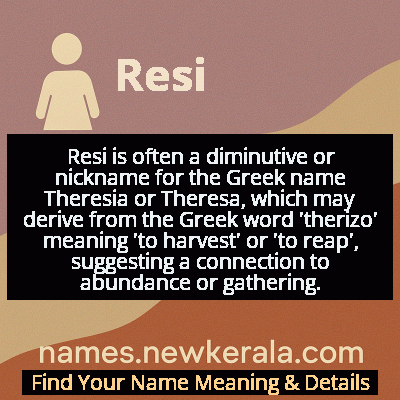Resi Name Meaning & Details
Origin, Popularity, Numerology Analysis & Name Meaning of Resi
Discover the origin, meaning, and cultural significance of the name RESI. Delve into its historical roots and explore the lasting impact it has had on communities and traditions.
Name
Resi
Gender
Female
Origin
Greek
Lucky Number
6
Meaning of the Name - Resi
Resi is often a diminutive or nickname for the Greek name Theresia or Theresa, which may derive from the Greek word 'therizo' meaning 'to harvest' or 'to reap', suggesting a connection to abundance or gathering.
Resi - Complete Numerology Analysis
Your Numerology Number
Based on Pythagorean Numerology System
Ruling Planet
Venus
Positive Nature
Harmonious, responsible, caring, and artistic.
Negative Traits
Overly idealistic, superficial, possessive, or jealous.
Lucky Colours
Pink, turquoise.
Lucky Days
Friday.
Lucky Stones
Diamond, turquoise.
Harmony Numbers
2, 3, 9.
Best Suited Professions
Artists, musicians, teachers, healthcare workers.
What People Like About You
Warmth, nurturing nature, artistic flair.
Famous People Named Resi
Resi Hammerer
Alpine skier
Competed in 1952 Winter Olympics and won multiple Austrian national skiing championships
Resi Reiner
Actress
Prominent German actress in Weimar-era cinema and theater productions
Resi Stiegler
Alpine skier
American World Cup ski racer and Olympic competitor continuing family skiing legacy
Name Variations & International Equivalents
Click on blue names to explore their detailed meanings. Gray names with will be available soon.
Cultural & Historical Significance
In Central European culture, especially in Austria, Bavaria, and German-speaking regions, Resi developed as an affectionate familial form used within close-knit communities. The name embodies Gemütlichkeit—a German concept describing warmth, friendliness, and belonging. Throughout the 19th and early 20th centuries, Resi became synonymous with traditional values, domestic wisdom, and community cohesion. The name appears frequently in Austrian and Bavarian folk songs, literature, and local traditions, often representing the archetypal caring, practical woman who maintains family and community bonds through her gathering and nurturing nature.
Extended Personality Analysis
Individuals named Resi typically exhibit characteristics aligned with their name's meaning of 'gatherer.' They often demonstrate exceptional organizational abilities and a natural talent for bringing people together, creating cohesive social environments where others feel valued and included. Their approach to life combines methodical planning with genuine warmth, making them both effective managers and compassionate friends. Resi's tend to be observant and perceptive, able to identify needs and resources that others might overlook, then systematically gather and distribute them for maximum benefit.
These personalities often display remarkable emotional intelligence and practical wisdom, making them sought-after advisors and confidantes. They approach challenges with a harvest mentality—understanding that solutions often come from carefully gathering information, perspectives, and resources over time rather than seeking immediate fixes. Their strength lies in patience and persistence, coupled with an intuitive understanding of timing—knowing when to gather, when to preserve, and when to distribute. This makes Resi's particularly valuable in community leadership, education, healthcare, and any field requiring both systematic thinking and human connection.
Modern Usage & Popularity
In contemporary naming practices, Resi maintains a distinctive position as both a traditional diminutive and occasional standalone name, primarily in German-speaking regions of Europe. While its usage has declined from its peak in the early 20th century, it experiences periodic revivals as part of the vintage name trend, particularly among parents seeking names with cultural authenticity and warmth. In Austria and Southern Germany, Resi remains more common as a family nickname for Therese while occasionally appearing on birth certificates as a given name. Digital name tracking platforms show consistent but modest global usage, with noticeable concentrations in Central Europe and among families with German heritage abroad. The name's appeal lies in its combination of traditional roots, pleasant sound, and meaningful etymology, making it an attractive choice for parents valuing cultural continuity and meaningful names in an increasingly globalized world.
Symbolic & Spiritual Meanings
Symbolically, Resi embodies the profound concept of meaningful accumulation and thoughtful stewardship. The gathering motif extends beyond literal harvest to represent the collection of wisdom, relationships, experiences, and resources that enrich human life. This symbolism speaks to the importance of discernment in what we gather—emphasizing quality, relevance, and sustainability over mere quantity. The name suggests a personality that understands life as a continuous process of careful selection and preservation, where true abundance comes from gathering what truly matters and knowing how to share it generously.
Metaphorically, Resi represents the cyclical nature of existence—the understanding that gathering necessarily precedes distribution, and that preservation enables future abundance. This symbolism connects to broader philosophical concepts about the relationship between individual effort and community benefit, personal growth and collective wisdom. The name carries connotations of earth wisdom, practical spirituality, and the understanding that the most valuable gatherings are often invisible—collections of knowledge, compassion, and shared memories that sustain us through life's seasons. It suggests a deep appreciation for process over product and relationship over transaction in human experience.

